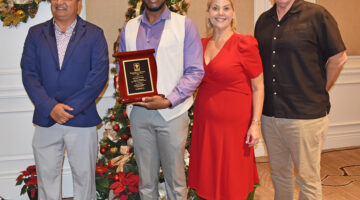Business Law 101 / Chapter 777- Who is criminally liable?
By Albert Kelley Esq.
Chapter 777 of the Florida Statutes discusses who is responsible for a crime. This seems like an easy question, but it may be more expansive than you think.
It starts simply enough: “Whoever commits any criminal offense against the state, whether felony or misdemeanor” but then adds “or aids, abets, counsels, hires, or otherwise procures such offense to be committed, and such offense is committed or is attempted to be committed, is a principal in the first degree and may be charged, convicted, and punished as such, whether he or she is or is not actually or constructively present at the commission of such offense.” So, not only is the person who actually commits the crime responsible, but anyone who helps in the planning or preparation, is also just as guilty as the one who commits the crime. Let me put this concept into historical perspective. The planners and conspirators can receive the same punishment as the person committing the crime. As an example, if two people rob a bank and during the robbery one of the bank robbers shoot somebody, both will be charged with murder.
What if someone helps a criminal escape or cover up a crime? This is a little more complicated. First, the legislature doesn’t want to cause intra-family dissension, so after-the-fact assistance to a crime is not charged against a husband or wife, parent or grandparent, child or grandchild, brother or sister. However, anyone else who gives assistance before the crime or after the crime, knowing a crime has been committed or gives aid or tries to help a criminal avoid or escape detection, arrest, trial or punishment is deemed an accessory after the fact. A person is also deemed an accessory after the fact if they assist or give aid to a person knowing the person committed child abuse, neglect of a child, aggravated child abuse, aggravated manslaughter of a child under 18 years of age, or murder of a child under 18 years of age, or if they take some action to help the offender avoid or escape detection, arrest, trial, or punishment.
Generally, the charges against an accessory after the fact is one level down from the principle. In other words, if the criminal commits a capital felony, the accessory after the fact will be charged with a first degree felony. If the criminal is charged with a first degree felony, the accessory after the fact will be charged with a second degree felony. For sentencing purposes, an accessory after the fact is ranked two levels below the primary offense.
What about someone who wants to commit a crime, but fails? Then it depends on the actions they take. If the person attempts to commit a crime and takes any action towards it, but fails or is caught before the crime is committed, they are guilty of “Criminal Attempt” (Criminal attempt also includes any action taken by an adult who, with intent to commit an offense prohibited by law, allures, seduces, coaxes, or induces a child under the age of 12 to engage in an offense prohibited by law). If the person commands, encourages, hires, or requests another person to engage in criminal activity, they are guilty of “Criminal Solicitation”. And if they agree or conspire with another person to commit a crime, they are guilty of “Criminal Conspiracy”. These charges are generally punished at one level below the primary offense. It is a defense to these charges if the person abandons the attempt or persuades the co-conspirators or those solicited to abandon the action or takes other action to stop the crime from being committed.
Al Kelley is a Florida business law attorney located in Key West and previously taught business law, personnel law and labor law at St. Leo University. He is also the author of four law books: (“Basics of Business Law” “Basics of Florida’s Small Claims Court”, “Basics of Florida’s Landlord/Tenant Law” and “Basics of Starting a Florida Business” (Absolutely Amazing e-Books)). This article is being offered as a public service and is not intended to provide specific legal advice. If you have any questions about legal issues, you should confer with a licensed Florida attorney.
[livemarket market_name="KONK Life LiveMarket" limit=3 category=“” show_signup=0 show_more=0]






No Comment